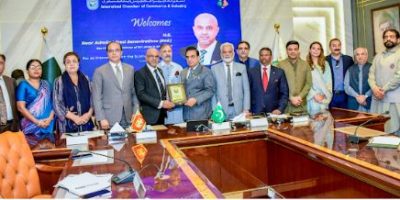High cost of doing business dangerous for export-oriented knitwear industry

DNA
ISLAMABAD – The high cost of doing business has proved to be dangerous for the value-added export-oriented knitwear industry, as the ever-increasing gas and power tariffs are the real threat to the economy amidst frequent upward revisions in policy rate and continuous fluctuations in rupee against dollar.
These views were expressed in an interactive session held here at Zonal office of Pakistan Hosiery Manufacturers & Exporters Association (PHMA) to review the challenges faced by the PHMA members, with the PHMA North Zone Senior Vice Chairman Amanullah Khan in the chair. Participants of the meeting urged the Central Bank to allocate funds for renewable energy schemes, including solar energy financing exclusively to the export-oriented value-added textile sector. This strategic allocation will not only boost apparel sector’s growth but also promote a more inclusive and resilient economy.
He said that all stuck-up claims of the exporters, including DLTL, DDT, Customs Rebates and Sales Tax refunds should be released. The liquidity crunch was a major stumbling block in the way of improving exports. Demanding the restoration of zero rating regime, he suggested that the Sales Tax regime for export sector should be totally separated from the local business and that refund of Sales tax to exporters be ensured within 72 hours of the filing of claim.
The apparel sector was showing regular growth in exports and should be encouraged through long term policy measurers so that foreign exchange earnings for Pakistan could be increased.
PHMA North Zone Senior Vice Chairman Amanullah Khan, in his address, proposed the central bank to review its credit policies by fixing a special quota to finance the knitwear hosiery sector’s small and medium enterprises, as only the large industries have been availing government’s all major concessional export loaning facilities, while very limited financing is left for the PHMA members which are the backbone of the economy. We must advocate for targeted and fixed allocations for apparel sector SMEs in renewable and solar energy financing, particularly those aimed at the export-oriented sector.
PHMA leader cautioned the government saying the move of increasing energy tariffs was unwise and would sabotage hard efforts of exporters to enhance Pakistan’s exports in previous years. He asked the govt to ensure a level-playing field by offering competitive energy tariffs and continuing the Duty Drawback of Local Taxes and Levies scheme, as committed in the new five-year textile and apparel policy. He stressed that energy rates for industries should be brought at par or below the tariff prevailing in the competing regional countries.
He demanded a level-playing field with regional competitors through continuation of previous concessionary energy tariffs for the export industry, terming the previous government’s decisions to discontinue the tariff concession for five export-oriented sectors unwise and disastrous for exporters.
He remarked that at a time of unsatisfactory export volumes and low industrial growth, the hike in electricity tariffs for the export industry was surprising, as it will prove dangerous for the country’s knitwear industry.
PHMA Senior Vice Chairman observed that the disruption of concessions committed under the Textile Policy 2020-25 has resulted in decline in industry’s textile exports. He claimed that export performance was severely set back by the drastic turn in macroeconomic conditions during 2023-24, of which the historic rise in bank lending rates; raw material and, retraction of concessional gas and electricity tariffs damaged prospects of export growth irreparably.
He said that Pakistan’s core issue was high cost of doing business which rendered its industrial production uncompetitive, suggesting the government to work on bringing around significant improvements in ease and cost of doing business for the export industry.
Focus on export growth necessarily involves promoting textiles as this sector contributes 62% of all exports. Pakistan’s textile industry, however, is facing a major crisis as it is rapidly losing credibility and competitiveness in the global market.
The $19.3 billion industry, which relies heavily on exports, is experiencing a decline in global shipments. This situation is causing concern among its loyal international customers, who are becoming increasingly skeptical about the industry’s ability to meet deadlines and fulfill orders in a timely manner.
Related News

Colombo eyes Islamabad partnerships to boost bilateral trade
ISLAMABAD, FEB 25 /DNA/ – Rear Admiral Fred Senevirathne (Retd.), High Commissioner of Sri LankaRead More

ICCI chief welcomes cut in hotel FAR charges
ISLAMABAD, FEB 24 /DNA/ – President of the Islamabad Chamber of Commerce and Industry (ICCI),Read More


Comments are Closed